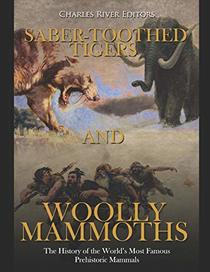My school days must have preceded the last Ice Age because I don't remember learning about such fascinating mammals as the saber-toothed tigers and the woolly mammoths. What scientists have learned about these creatures in the past 50 years is astounding (and wonderful reading). Together, the woolly mammoth and the saber-toothed tiger were some of the most famous megafaunas in the Pleistocene Epoch.
I was unaware that both smilodons and wooly mammoths roamed North America in earlier times.
WOOLLY MAMMOTHS --
The woolly mammoths died off by the last Ice Age, about 10,000-years ago, along with their cousins, the mastodons. They were the subject of many cave paintings of early man. The age of the art is believed to be from 30,000 to 12,000-years ago.
Unfortunately, it is rather easy to see why they died out. Mammoths were herbivores that needed almost 500 lbs/day of leaves, grasses, and other vegetation to stay alive. Gestation for babies was 22 months and the mother fed the baby for 2 years. Scientists believe that mothers usually bore only one (but occasionally twins), every 5 years! As the weather changed and they were hunted by early man, these "gentle giants" disappeared.
The stunning thing about this book is the belief postulated by geneticists and scientists -- the woolly mammoth can be cloned within the next 10 years. The story of why this is possible is worth the cost of the book alone.
SABER-TOOTHED TIGERS (SMILODONS) --
Compared to today's wild felines (lions and tigers, to whom saber-tooths were only distantly related), they were stockier with well-muscled legs. The smilodons liked to attack their prey from the low branches of trees; they didn't need slim, sleek bodies because they didn't chase their prey across vast grasslands. Some varieties of these animals weighed between 400 and 800 lbs.
Quite a bit of time is spent talking about the smilodons that emerged from the La Brea Tar Pits (in Los Angeles, California).* Another shocker was the info that smilodons have been sited in Peru and Brazil in the last 100 years, or so.
***
* Charles Rivers Editors wrote the book: "TheLa Brea Tar Pits: The History and Legacy of One of the World's Most Famous Fossil Sites." It is one of my five favorite books.
I was unaware that both smilodons and wooly mammoths roamed North America in earlier times.
WOOLLY MAMMOTHS --
The woolly mammoths died off by the last Ice Age, about 10,000-years ago, along with their cousins, the mastodons. They were the subject of many cave paintings of early man. The age of the art is believed to be from 30,000 to 12,000-years ago.
Unfortunately, it is rather easy to see why they died out. Mammoths were herbivores that needed almost 500 lbs/day of leaves, grasses, and other vegetation to stay alive. Gestation for babies was 22 months and the mother fed the baby for 2 years. Scientists believe that mothers usually bore only one (but occasionally twins), every 5 years! As the weather changed and they were hunted by early man, these "gentle giants" disappeared.
The stunning thing about this book is the belief postulated by geneticists and scientists -- the woolly mammoth can be cloned within the next 10 years. The story of why this is possible is worth the cost of the book alone.
SABER-TOOTHED TIGERS (SMILODONS) --
Compared to today's wild felines (lions and tigers, to whom saber-tooths were only distantly related), they were stockier with well-muscled legs. The smilodons liked to attack their prey from the low branches of trees; they didn't need slim, sleek bodies because they didn't chase their prey across vast grasslands. Some varieties of these animals weighed between 400 and 800 lbs.
Quite a bit of time is spent talking about the smilodons that emerged from the La Brea Tar Pits (in Los Angeles, California).* Another shocker was the info that smilodons have been sited in Peru and Brazil in the last 100 years, or so.
***
* Charles Rivers Editors wrote the book: "TheLa Brea Tar Pits: The History and Legacy of One of the World's Most Famous Fossil Sites." It is one of my five favorite books.




